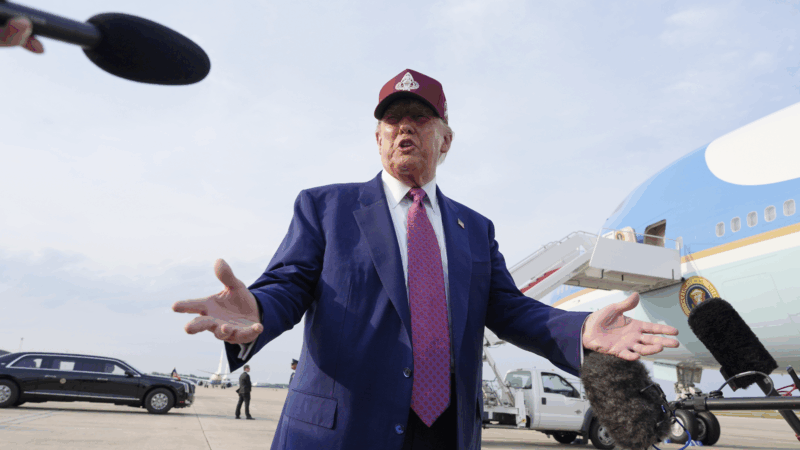Majorities in key U.S. allies have no confidence in Trump’s global leadership
More than half of people in key U.S. allies – including France, the United Kingdom, Germany, South Korea and Japan – have no confidence in President Trump’s leadership in world affairs, according to a new global survey by the Pew Research Center.
People in 15 of 24 countries downgraded their ratings of the U.S., according to the survey of more than 28,000. In addition, majorities in almost every country surveyed describe Trump as “arrogant” and “dangerous.”
NPR reached out to the White House for a response to the survey’s results.
“President Trump is the president of the American people and his priority is to work on their behalf, nobody else’s,” wrote spokesman Steven Cheung. “The overwhelming majority of Americans support his America First agenda. America is back on top after four years of failure under Joe Biden.”
In fact, recent polls show the president’s approval rating stands at about 43%.
Richard Wike, who runs the global attitudes team at Pew, says one reason that Trump and the U.S. are receiving low ratings overseas is many people around the world want a more engaged America.
“If you look at our surveys over the years, people in other countries often want to see the U.S. working collaboratively, engaging in efforts with other countries to address big global challenges,” says Wike. “When the U.S. is going its own way, it’s seen more negatively.”
For instance, Trump pulled the U.S. out of the Paris international climate accord for the second time after taking office in January. In the Pew survey, less than 20% of people in Canada, France, Germany, Australia and Spain expressed confidence in Trump’s handling of climate change.
Trump has also imposed a series of steep, on-again, off-again tariffs on allies, such as Canada, and rivals, such as China, wreaking havoc with financial markets. Less than a third of people in the Netherlands, Italy, Japan and Sweden expressed confidence in the president’s ability to manage global economic problems, the survey found.
The survey was conducted from Jan. 8 to April 26 in 24 countries across Europe, the Middle East, the Asia-Pacific, sub-Saharan Africa and Latin America.
Of course, foreigners don’t vote in American elections, but Wike says international political opinion of the U.S. still matters.
“I think it makes it easier for leaders to cooperate with the United States if the U.S. is relatively popular in their country,” Wike says. “It doesn’t mean that a leader is not going to cooperate with the United States if the U.S. is unpopular . . . but hey, look, politicians respond to incentives.”
Some people did find positive aspects to Trump’s style. For instance, majorities in 18 countries consider Trump a strong leader. Ratings of the U.S. have improved since last year in Israel, Nigeria and Turkey.
Trump also did well with populists in Europe, according to the survey. 88% of people who support Hungarian Prime Minister Viktor Orban’s ruling Fidesz Party also express confidence in Trump, as do 56% of supporters of Germany’s right-wing party, Alternative for Germany.
This is not the first time many people overseas have expressed concerns about Trump and his personality. Confidence in Trump’s ability to do the right thing in international affairs plunged during the early months of his first term, according to a Pew survey at the time. For instance, 86% of Germans had confidence in President Barack Obama towards the end of his term. But that fell to just 11% after Trump took office in 2017. Back then, a majority of those polled in 37 countries called Trump arrogant, intolerant and dangerous.
5 papers from the Super Bowl of Economics
Planet Money went to the annual meeting of the American Economics Association, and we saw some fascinating papers presented there.
I thought I’d heard my dad’s voice for the last time. A movie helped me find it again
A period drama, a Supreme Court case and voice our film critic hadn't heard in decades.
19 Winter Olympic storylines we’re watching (they’re not just about sports)
The Winter Olympics promise plenty of high adrenaline, fierce competition, historic firsts and emotional moments over 2 1/2 weeks. Here are some of the names and narratives to keep an eye on.
Privatizing Fannie Mae is risky. Would it be a win for taxpayers or Trump’s donors?
The idea has alarmed critics, who warn it could rattle financial markets and drive up mortgage rates, while potentially generating large profits for key Trump supporters.
Here’s why people say they’re using ‘Are You Dead?’ and apps like it
Safety check-in apps — a way for loved ones to know that you're alive — have become more popular among adults who feel that modern life has made connection and community more difficult to maintain.
Can’t wait for Olympic curling? Trying its Southern cousin: skillet curling
It might seem inelegant to yeet an iron skillet across an ice rink. But this spinoff sport has its own techniques and lingo: You can throw a turtle at the bacon, for instance.






